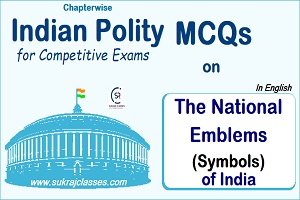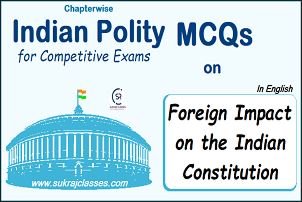
Indian Polity MCQs on “The Citizenship” in the Indian Constitution
Indian Polity MCQs on “The Citizenship” in the Indian Constitution, are important questions for all competitive exams i.e. UPSC, SSC, Railways, Banking, CET etc. Many questions were asked in pervious year’s exams from this topic. Let’s start the topic:
Que- 1. Which part of the Indian constitution provides for citizenship?
(A) Part I
(B) Part II
(C) Part III
(D) Part IV
Que- 2. Which Articles of Indian Constitution are related to citizenship?
(A) Article 3 to 10
(B) Article 4 to 11
(C) Article 5 to 11
(D) Article 6 to 11
Que- 3. From where was the principle of single citizenship in India taken?
(A) England
(B) France
(C) Canada
(D) USA
Que- 4. Who among the following has the exclusive power of determining the issue of citizenship in India?
(A) The Parliament.
(B) The President.
(C) Central Government.
(D) State Government.
Que- 5. Indian citizenship cannot be obtained by….?
(A) Birth.
(B) Naturalization.
(C) Absorbing any part of land.
(D) Depositing money in Indian Banks.
Que- 6. How many years does a person of Indian origin need to reside in India to become a citizen of India under the Citizenship Act, 1955?
(A) 5 years.
(B) 3 years.
(C) 7 years.
(D) 10 years.
Que- 7. Which one of the following features of citizenship in India is correct?
(A) Dual Citizenship of the State and Nation.
(B) Single Citizenship of a State.
(C) Single Citizenship of whole of India.
(D) Dual Citizenship of India and another Country.
Que- 8. Who/Which of the following is competent to prescribe condition for acquisition of citizenship?
(A) Election Commission
(B) President
(C) Parliament and State Legislatures jointly
(D) Parliament
Que- 9. Which country accepted the policy of Dual Citizenship?
(A) India
(B) Canada
(C) Australia
(D) U.S.A.
Que- 10. The citizenship provided by the Constitution of India is …?
(A) Dual citizenship
(B) Single citizenship
(C) Both of the above
(D) None of the above
Que- 11. The category of ‘Overseas Citizens of India’ was entered in the Citizenship Act of India through an amendment in the year ……?
(A) 1996
(B) 2005
(C) 1992
(D) 1986
Que- 12. Which one of the following statements regarding an Overseas Citizen of India (OCI) is not correct?
(A) An OCI is a citizen of another country.
(B) An OCI possesses multiple-entry long-term visa for visiting India.
(C) An OCI is at par with NRIs in all matters.
(D) An OCI is not entitled to the fundamental right to equality of opportunity in public employment.
Que- 13. Who among the following is not eligible for registering as overseas citizen of India cardholder under the Citizenship Amendment Act, 2015?
(A) A minor child whose parents are an Indian citizen.
(B) Spouse of foreign origin of an Indian citizen.
(C) Indian who migrated to Pakistan after partition.
(D) A great grandchild of a person who is a citizen of another country but whose grandparents were a citizen of India at the time of commencement of the Constitution.
Que- 14. The basis of acquiring Citizenship through Naturalization is……?
(A) Birth
(B) Selection
(C) Forcefully
(D) Heredity
Que- 15. The Delhi High Court has recently granted Indian citizenship to those Tibetans who were born here in between ….?
(A) January 31, 1960 – March 31, 1990
(B) August 15, 1947 – July 30, 1987
(C) January 26, 1950 – July 01, 1987
(D) January 01, 1952 – August 15, 1990
Indian Polity MCQs on “The Citizenship”





